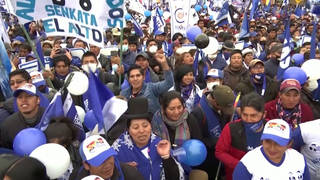
Related
Topics
Tens of thousands of protesters in Bolivia marched on the capital La Paz after President Carlos Mesa’s attempt to push through a law giving large corporations and investors greater control of the country’s significant natural gas resources. [includes rush transcript]
We move now to Latin America’s poorest nation Bolivia where tens of thousands of people marched on the capital La Paz. At issue is President Carlos Mesa’s attempt to push through a law giving large corporations and investors greater control of the country’s significant natural gas resources. Already, Bolivia’s gas and oil production is controlled by a dozen foreign corporations. The protests were largely made up of indigenous Bolivians who represent a sizable majority of the country’s population. The largest contingent came from the militant neighborhood of el Alto. When they got to the main square in the capital, the demonstrators were met by a large police presence. At times, the police used tear gas and water against the protests.
Meanwhile, the main opposition leader Evo Morales, headed up a simultaneous protest from the Andean highlands. His contingent was marching 120 miles to La Paz. In other areas of the country, protesters set up blockades on several highways. The protests were organized by a coalition of indigenous groups, coca farmers and trade unionists.
Momentum is building in Bolivia to bring down the government and many believe that Evo Morales could win the next presidential election. That would certainly cause concern among multinational corporations, as well as in Washington. In October of 2003, mass protest and the government’s massacre of scores of protesters, forced President Gonzalo Sanchez de Lozada to flee the country and seek protection in the United States.
Transcript
AMY GOODMAN: We move now to Latin America’s poorest nation, Bolivia, where tens of thousands of people marched on the capital La Paz. At issue is President Carlos Mesa’s attempt to push through a law giving large corporations and investors greater control of the country’s significant natural gas resources. Already, Bolivia’s gas and oil production is controlled by a dozen foreign corporations. The largest contingent came from the militant neighborhood of El Alto. When they got to the main square in the capital, the demonstrators were met by a large police presence. At times the police used tear gas and water against the protests.
PROTESTER: Companeros, we wish to take back our hydrocarbon. The moment of fight has arrived, and we have to fight until the final consequences. If we have to die, our children will live, campaneros.
AMY GOODMAN: One of the protesters speaking in Bolivia. Meanwhile, the main opposition leader, Evo Morales, headed up a simultaneous protest from the Andean highlands. His contingent was marching 120 miles to La Paz. In other areas of the country protesters set up blockades on several highways. The protests were organized by a coalition of indigenous groups, coca farmers and trade unionists. The protests this month that took place in Bolivia came as Latin America is seeing significant success among popular progressive movements. From Hugo Chavez of Venezuela, Lula da Silva of Brazil to the changes of government in Uruguay and now Ecuador, there is continent-wide trend that has Washington concerned. The U.S. has long exploited countries throughout Central and Latin America for the natural resources, labor, and land. Over the decades this exploitation has been backed up by force and through devastating policies dictated to puppet regimes.












Media Options